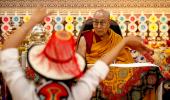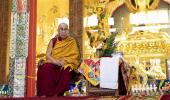'Although China has been ruling over Tibet for past 75 years, it has no legitimacy.'

"China does not understand the institution of the Dalai Lama and is using its brutal military, economic power to interfere," says Tenzin Tsundue, writer and activist for Tibetan freedom.
A Tibetan refugee born in India, he crossed into Tibet as a young man to fight for freedom and was arrested, jailed and tortured in a Lhasa prison.
He was pushed back to India after three months.
Tsundue, now 50, has vowed to continue the struggle for independence in exile till Tibet is free.
He has been wearing a red bandana since unfurling a Free Tibet poster at the hotel where then Chinese premier Zhu Rongji was staying during a visit to Mumbai in 2002.
He did the same in Bengaluru during then Chinese premier Wen Jaibao's visit, and has taken an oath to only take off the bandana after Tibet is free of Chinese occupation.
"China has have failed in winning the hearts of the Tibetan people. The Tibetans in Tibet love and respect Dalai Lama more than the Chinese government," he tells Rediff's Archana Masih on the eve of the Dalai Lama's 90th birthday.
- Part 1 of the Interview: 'There Will Be A Need For A Leader Like The Dalai Lama'
His Holiness has stated that his succession will carried out by the Ganden Trust and the Office of the Dalai Lama. China has rejected the plan.
How can Chinese interference be prevented?
I don't know why you are bringing China into this.
The Dalai Lama, leader of the Tibetans, has come from within the Tibetan community for the past 400 years, whereas the Chinese government is only 75 years old.
The Tibetan people have the sovereign right to select our leader in the traditional way. China has nothing to do with it.
China is a threat to India, Nepal, Bhutan and many other countries. China doesn't even understand the institution of the Dalai Lama.
The institution of the Dalai Lama is a deeply spiritual, complicated, religious tradition of the Tibetan community.
The root of the Buddhist culture comes from India. We believe that Avalokitesvara, the Bodhisattva of love and compassion, rests in the form of human life in the Dalai Lama.
China does not understand this and is using its brutal military, economic power to interfere. Although China has been ruling over Tibet for past 75 years, they have no legitimacy.
They have failed in winning the hearts of the Tibetan people. The Tibetans in Tibet love and respect the Dalai Lama more than the Chinese government. Therefore, China is insecure. China is scared that the Dalai Lama is not in their control and that there will be a 15th Dalai Lama.
His Holiness the Dalai Lama has made it clear that while he is here, he will do his duty. At the same time, he is making sure that the next Dalai Lama is selected through due process and the decision comes from within the Tibetan community.

The 15th Dalai Lama when chosen will be a young person. Are you concerned about the vacuum in the interim period till he attains adulthood?
How will he fulfil his duties when he is still growing up?
There are other traditional ways through which the future Dalai Lama may be selected. And there is one tradition called Madey Tulku which has been used by rinpoches and lamas who encounter a health issue or other such circumstances.
In this case, they would usually select a boy who is then trained, groomed and nurtured to continue that important legacy.
The option is also there for His Holiness that he may select a boy who could lead the legacy of His Holiness in the next 10-15 years.
You entered Tibet as a young man and were arrested.
I did not go to Tibet as a tourist, but to fight for freedom. I was arrested, jailed and tortured. It was perhaps the most difficult time faced by me.
I was suspected of being sent by Government of India on a spy mission. I told them I have come on my own effort for the freedom of Tibet.
They continued their investigation through their informants in New Delhi and in Dharamsala. Eventually, when they found out that I had no such contact and was of no use for them, they sent me back.
I was a fresh college graduate when I went to Tibet. The first step in Tibet was a great sense of pride, but at the same time, it was physically and emotionally traumatic.
When I look back, I think it was a real good training ground. It made me an activist who will never give up on Tibet.

You wear a red bandana as a sign of protest.
After being thrown out of Tibet, I went to Mumbai for my master's degree. I thought now that my attempt to fight and die in Tibet has not worked, I should work for Tibet's freedom from exile in India where I grew up.
I started to wear a red bandana which is the symbol of my childhood pledge that I will liberate Tibet.
I will take this off when Tibet becomes independent and I am a free citizen. This represents my dream and commitment for Tibet.
I've been wearing the bandana since 2002 which was the year when I did a major protest during Chinese premier Zhu Rongji's visit to Mumbai. He was staying at the Oberoi Hotel now called Hilton. I climbed up the building, went up to 14th floor through a scaffolding and raised a free Tibet banner.
This attracted a lot of media attention on Tibet. We won because Zhu's visit was overshadowed by the protest.

On the cusp of His Holiness's birthday, what are the primary concerns of the Tibetan people?
There are three important factors for any country to be free.
1. Commitment and the determination of the people.
As long as we continue our struggle, there will be a time when China will becomes weaker and the international community will find a reason to support Tibet -- not because they love Tibet, but because they find Tibet useful in their battle against China.
China has been playing the bully in South Asia, and against the United States itself.
Since COVID-19, the international community has started isolating China. Countries don't want to be dependent on Chinese supply lines. So there are many factors that are coming together.
2. 1.4 billion Chinese cannot be kept under suppression forever. They also want freedom and democracy -- and that change is happening.
3. There's a global complicity in China's rule over Tibet.
China has been mining gold, copper, lithium and rare earths in Tibet. Xi Jinping promised to sell rare earths to Donald Trump. These resources will be secured from Tibet. The Chinese have already said in published articles that the most important natural resources in China are coming from Tibet.
Tibet comprises 2.5 million square kilometres of land, one-fourth the size of China. China is mining and making tech products and consumer goods which it sells to countries around the world.
Everybody has benefited from China at the cost of Tibet. The international community must pay back to Tibet, particularly the United States that has been trading with China for over 30 years.
We are at the cusp of an existential struggle in Tibet and suffering genocide inside Tibet. Therefore, the international community has the responsibility to support Tibet.
The United States has said Tibet was a free and independent country and that the Tibetan people have the right to self-determination. This is how the United States is taking the lead in changing their policy and saying that Tibetan people have right to self determination.
Canada, for example, had said that they will stand with the Dalai Lama's choice for reincarnation. India has always supported the cause of Tibet without making it into a political statement.
India gave us refuge, shelter, and freedom to practice our religion, culture, and most importantly develop our unique Tibetan democracy that has kept the freedom struggle and our hope alive.
India has contributed for the cause of Tibet the most. It is also in the long-term interest of India that Tibet is once again established as a free and independent country. That would relieve India from Chinese pressure.
Feature Presentation: Aslam Hunani/Rediff









